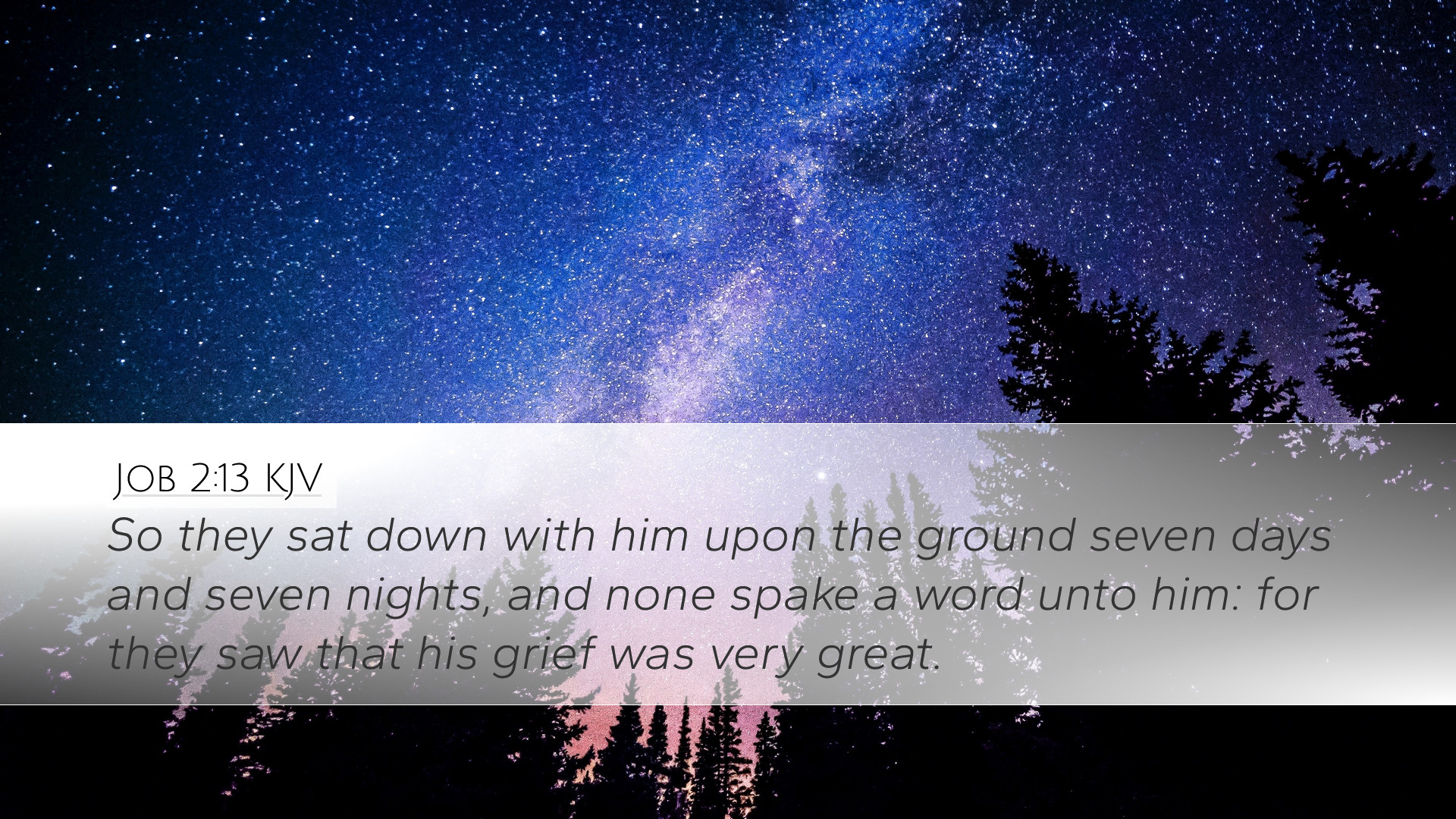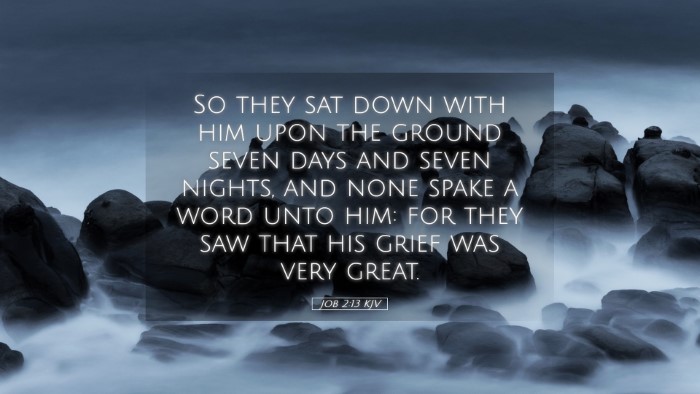Old Testament
Genesis Exodus Leviticus Numbers Deuteronomy Joshua Judges Ruth 1 Samuel 2 Samuel 1 Kings 2 Kings 1 Chronicles 2 Chronicles Ezra Nehemiah Esther Job Psalms Proverbs Ecclesiastes Song of Solomon Isaiah Jeremiah Lamentations Ezekiel Daniel Hosea Joel Amos Obadiah Jonah Micah Nahum Habakkuk Zephaniah Haggai Zechariah MalachiJob 2:13
Job 2:13 KJV
So they sat down with him upon the ground seven days and seven nights, and none spake a word unto him: for they saw that his grief was very great.
Job 2:13 Bible Commentary
Commentary on Job 2:13
Text: "So they sat down with him upon the ground seven days and seven nights, and none spake a word unto him: for they saw that his grief was very great." (Job 2:13, KJV)
Introduction
The Book of Job profoundly explores themes of suffering, faith, and divine sovereignty. In Job 2:13, we witness a crucial moment in the narrative where Job's friends arrive and share in his grief. This verse serves as a poignant transition from Job's initial calamity to the in-depth dialogues that follow. Here, we delve into various insights from notable public domain commentaries to enrich our understanding of this text.
Contextual Insights
Understanding the context of Job's suffering is essential. In the preceding chapters, Job loses his wealth, children, and health. The intense grief he experiences is compounded by the isolation it brings. This moment of silence shared among friends is laden with significance, representing both human empathy and the limitations of human understanding in the face of profound suffering.
Matthew Henry's Commentary
Matthew Henry emphasizes the emotional gravity of this scene, noting that Job's friends, upon hearing of his calamity, felt compelled to express their condolences. He remarks:
"They came, not to speak, but to sympathize; and they did it in a manner that was most acceptable, they sat down with him." — Matthew Henry
This observation highlights that the act of presence is often more significant than the words spoken. Henry points out that the silence of the friends reflects their deep understanding of the weight of Job's sorrow. They recognized that sometimes, sharing silence can be a powerful form of support.
Albert Barnes' Commentary
Albert Barnes also provides a thorough analysis of this verse, stressing the importance of the number seven in the Bible as a symbol of completeness and perfection. He states:
"The seven days of mourning are emblematic of the entire period of grief; they signify that their sorrow was complete." — Albert Barnes
Barnes elucidates how this period of mourning reflects cultural practices of the time, where extended mourning rituals were common. This suggests that the depth of Job's pain warranted a profound response, showcasing the communal aspect of grief in ancient times.
Adam Clarke's Commentary
Adam Clarke provides a more personal dimension to the interpretation, observing the physical and emotional posture of Job and his friends. He notes:
"They showed their respect by sitting down with him on the ground; it was a proper mark of respect, sympathy, and mourning." — Adam Clarke
This notion of sitting on the ground indicates humility and the gravity of the situation. Clarke argues that this act illustrates an essential aspect of empathy; it reduces the distance between the sufferer and the comforters. Their physical presence lent weight to their empathy, establishing a sacred space where mourning could be shared.
Theological Reflections
This verse serves as a theological cornerstone in understanding the nature of suffering and the communal aspect of grief. Scholars and theologians can glean several insights:
- The Power of Silence: Sometimes, silence speaks louder than words. In pastoral care, being present for individuals in their times of grief can provide necessary comfort.
- The Role of Community: Job's friends demonstrate the importance of community in the face of suffering. The support of others is crucial, highlighting the interdependence of humanity.
- The Nature of Grief: The seven days signify both the depth and extent of grief, allowing for contemplation on how grief is a process that varies greatly between individuals.
Conclusion
Job 2:13 encapsulates a moment of profound human experience that transcends cultural and temporal boundaries. Through the insights of Matthew Henry, Albert Barnes, and Adam Clarke, we see how silence, presence, and shared mourning are essential aspects of the human experience in suffering. This passage invites pastors, students, theologians, and scholars to reflect on their own experiences of grief and the ways in which they provide support to others. In every context, the empathy shown by Job's friends serves as a timeless reminder of the importance of companionship in the valleys of despair.


